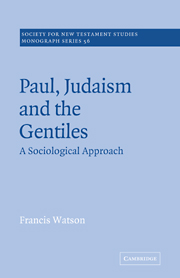Book contents
- Frontmatter
- Contents
- Preface
- Abbreviations
- 1 Paul, the Reformation and modern scholarship
- 2 The origins of Paul's view of the law
- 3 The Galatian crisis
- 4 Philippi, Corinth and the Judaizers
- 5 The situation in Rome
- 6 The social function of Romans: Rom. 2
- 7 The social function of Romans: Rom. 3–4
- 8 The social function of Romans: Rom. 5–8
- 9 The social function of Romans: Rom. 9–11
- 10 Conclusion
- Notes
- Bibliography
- Index
8 - The social function of Romans: Rom. 5–8
Published online by Cambridge University Press: 11 November 2009
- Frontmatter
- Contents
- Preface
- Abbreviations
- 1 Paul, the Reformation and modern scholarship
- 2 The origins of Paul's view of the law
- 3 The Galatian crisis
- 4 Philippi, Corinth and the Judaizers
- 5 The situation in Rome
- 6 The social function of Romans: Rom. 2
- 7 The social function of Romans: Rom. 3–4
- 8 The social function of Romans: Rom. 5–8
- 9 The social function of Romans: Rom. 9–11
- 10 Conclusion
- Notes
- Bibliography
- Index
Summary
In the previous two chapters, Paul's exposition of ‘justification by faith’ in Rom. 1–4 has been interpreted as an appeal to the Roman Jewish Christian congregation to unite with the Gentile congregation, thereby separating itself from the Jewish community as a whole. For this reason, these chapters contain a number of references to Jewish and Gentile Christians. According to 1:16, the gospel is ‘the power of God for salvation to everyone who believes, to the Jew first and also to the Greek’. 2:10 promises salvation to everyone who does good, ‘the Jew first and also the Greek’. 3:22b–24 proclaims that there is no distinction between Jew and Gentile in that both are guilty before God and both are redeemed through his grace. In 3:29f, Paul argues that since God is the God of Gentiles as well as Jews, he justifies Jews and Gentiles in exactly the same way, through faith. 4:9–12 argues that Abraham is the father of both Jewish and Gentile Christians, and it is these two groups who are identified in 4:16f with ‘the seed of Abraham’ who are heirs to the promised salvation. The emphasis on Jewish Christians as well as on Gentiles is very striking when one compares Romans to Galatians, in which the former play virtually no part (except as opponents). This new emphasis seems, in the light of 14:1–15:13, to be accounted for by the situation in Rome and Paul's purpose in writing Romans.
- Type
- Chapter
- Information
- Paul, Judaism, and the GentilesA Sociological Approach, pp. 143 - 159Publisher: Cambridge University PressPrint publication year: 1986



